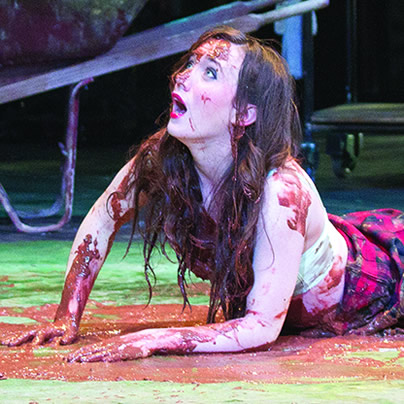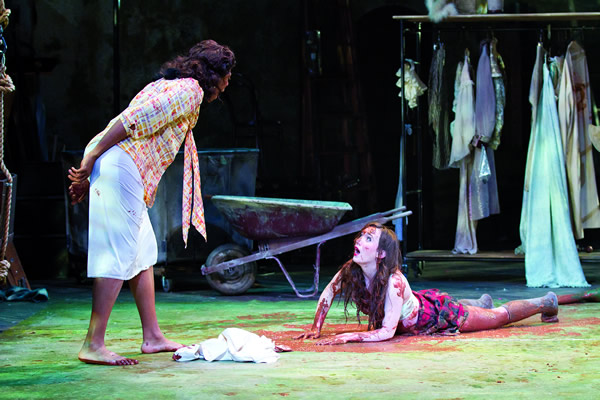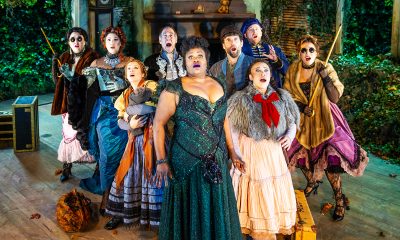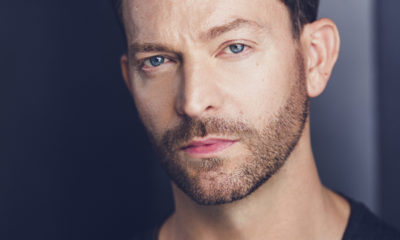Arts & Entertainment
‘Midsummer’ magic
Cleverly staged production transports action to the 1940s

‘A Midsummer Night’s Dream’
Through Dec. 30
Shakespeare Theatre Company
Sidney Harman Hall
610 F Street NW
$43-$105
202-547-1122

Christiana Clark as Helena and Amelia Pedlow as Hermia in Shakespeare Theatre Company’s production of ‘A Midsummer Night’s Dream.’ (Photo by Scott Suchman; courtesy of Shakespeare Theatre Company)
Shakespeare’s “A Midsummer Night’s Dream” brings together fairies, high-born Athenians and a sextet of skilled workmen with theatrical aspirations to create an improbable but magical world where even the most extreme situations end happily. In a visually exciting and extremely fun production currently playing at Shakespeare Theatre Company’s Sidney Harman Hall, director Ethan McSweeny keeps the old material fresh.
McSweeny’s take is appropriately magic-filled and newly theatrical. He sets the story in the 1940s inside an empty theater where possibilities are boundless. After all, as the program points out, Shakespeare premiered this play on a bare stage. With two balconies, a couple chandeliers, fly ropes, trap doors, Lee Savage’s beautiful set — a once grand theater — is essentially a blank slate, allowing the action to move convincingly (with the help of Tyler Micoleau’s skilled lighting) from Athens to an enchanted forest.
Cast members are equally versatile. Tim Cambell and Sara Topham appealingly play the comely ruling couple Theseus, Duke of Athens, and Hippolyta, Queen of the Amazons, as well as Oberon and Titania, King and Queen of the fairies. Adam Green splendidly transforms from Theseus’ oddly buttoned up assistant to literature’s mischief maker extraordinaire, Puck. Dressed in a corset and breeches, Green’s agile fairy nimbly traverses the set delighting in the mayhem he initiates without ever being too cutesy or grating. It’s a terrific performance.
“Dream” is a comic tale of young love, both requited and not. Hermia (Amelia Pedlow) cannot bear Demetrius (Chris Myers), the preppy boy her father insists she must marry. Instead she loves Lysander (Robert Beitzel), a folksy poet who is never without his acoustic guitar. Hermia’s best friend Helena (the excellent Christiana Clark), whose taste runs toward shopping and chocolates, loves Demetrius; but alas Demetrius loves Hermia. In order escape her father’s commands, Hermia and Lysander retreat to the woods.
Along the way, before all ends well, Hermia and Helena, clad only in their underthings, fall into a long, drawn out cat fight (staged wet and goopy by McSweeny). The boys (also stripped to their skivvies) get involved too. Puck watches from the sidelines perched in a theater balcony nibbling on popcorn. Invisible to the young lovers, he descends into the fray, cleverly egging on the battle. It’s a wonderfully well-rehearsed scene that comes off without a hitch.
“Dream’s” amusing subplot focuses on the rude mechanicals, a group of workers including a tinker and a tailor who are keen to perform a work of their own making (Shakespeare’s enduring slapstick-filled skit within the play) for the Duke and Queen. Led by Ted van Griethuysen as Peter Quince, the group of avid amateur thespians includes Robin Starveling (Christopher Bloch), Tom Snout (a dour Herschel Sparber), the slowwitted Snug (Robert Dorfman) and the wonderful David Graham Jones as Francis Flute who plays the mechanical’s enthusiastic ingénue. The group’s most eager member, Nick Bottom, is hilariously played by Bruce Dow as a total drama queen, more than ready for his close up.
McSweeney’s imagery is unforgettable: The show strikingly opens with the Duke (covered in medals) and his first lady (looking more than a little Evita-ish with a chic hat and carefully arranged fur piece), addressing their drab public from the palace balcony. There is the moving tableau featuring an ardent Titania and her disinterested paramour Bottom (who has been magically made into an ass) being pulled across stage by a team of young fairies as they lie in the gutted piano that serves as their bed. Then at the play’s close, there’s Puck making his apologies to the audience lit by the glow of a lone ghost light.
Jennifer Moeller provides a collection of impeccably realized costumes from the 1940s suits and gowns worn by the Athenians to Oberon and Titania’s romantic frayed remnants of court finery. And the fairies’ costumes: vintage foundation garments topped with odds and ends culled from an abandoned backstage.
With its classic storyline, inventive staging and delightful cast that handles the language and comedy more than ably, Shakespeare Theatre Company’s “Midsummer Night’s Dream” makes perfect holiday fare both for Bard aficionados and the uninitiated alike.
Out & About
Love board games and looking for love?

Quirk Events will host “Board Game Speed Dating for Gay Men” on Thursday, Jan. 22 at 7 p.m. at KBird DC.
Searching for a partner can be challenging. But board games are always fun. So what if you combined board games and finding a partner?
Picture this: You sit down for a night of games. A gaming concierge walks you through several games over the course of the night. You play classics you love and discover brand new games you’ve never heard of, playing each with a different group of fun singles. All while in a great establishment.
At the end of the night, you give your gaming concierge a list of the folks you met that you’d like to date and a list of those you met that you’d like to just hang out with as friends. If any two people put down the same name as each other in either column, then your gaming concierge will make sure you get each other’s e-mail address and you can coordinate a time to hang out.
Tickets cost $31.80 and can be purchased on Eventbrite.

Friday, January 16
Friday Tea Time will be at 12 p.m. at the DC Center for the LGBT Community. This is a social hour for older LGBTQ+ adults. Bring your beverage of choice. For more information, contact Mac ([email protected]).
Trans and Genderqueer Game Night will be at 7 p.m. at the DC LGBTQ+ Community Center. This is a relaxing, laid-back evening of games and fun. For more details, visit the DC Center’s website.
Go Gay DC will host “LGBTQ+ Social in the City” at 7 p.m. at Hotel Zena. This event is ideal for making new connections and community building or just to unwind and enjoy extended happy hour. Attendance is free and more details are available on Eventbrite.
Saturday, January 17
Go Gay DC will host “LGBTQ+ Community Brunch” at 11 a.m. at Freddie’s Beach Bar & Restaurant. This fun weekly event brings the DMV area LGBTQ+ community, including allies, together for delicious food and conversation. Attendance is free and more details are available on Eventbrite.
The DC LGBTQ+ Community Center and SMYAL will host a free film screening of “Mama Bears” celebrating queer youth, resilience, and the power of living authentically. Whether you’re a movie lover, looking to make new friends, or simply want a safe, affirming space to relax, this event is for you. Click this link to RSVP.
LGBTQ People of Color will be at 7 p.m. on Zoom. This peer support group is an outlet for LGBTQ people of color to come together and talk about anything affecting them in a space that strives to be safe and judgement free. There will be all sorts of activities like watching movies, poetry events, storytelling, and just hanging out with others. For more details, visit thedccenter.org/poc or facebook.com/centerpoc.
Sunday, January 18
Go Gay DC will host “LGBTQ+ Community and Conversation” at noon at As You Are. This event is for those looking to make more friends and meaningful connections in the LGBTQ+ community. Look for the Go Gay DC sign on the long table near the front window. Attendance is free and more details are available on Eventbrite.
Monday, January 19
“Center Aging: Monday Coffee Klatch” will be at 10 a.m. on Zoom. This is a social hour for older LGBTQ adults. Guests are encouraged to bring a beverage of choice. For more information, contact Adam ([email protected]).
Tuesday, January 20
Center Bi+ Roundtable will be at 7 p.m. on Zoom. This is an opportunity for people to gather in order to discuss issues related to bisexuality or as Bi individuals in a private setting.Visit Facebook or Meetup for more information.
Tae Kwon Do Class with Avi Rome will be at 12:30 p.m. This inclusive and beginner-friendly class, led by Instructor Avi Rome, offers a light warm-up, stretching, and instruction in basic techniques, patterns, and striking padded targets. Each session is designed to be adaptable for all ability and mobility levels, creating a welcoming space for everyone to build strength, confidence, and community through martial arts. For more details, visit the DC Center’s website.
Wednesday, January 21
Job Club will be at 6 p.m. on Zoom upon request. This is a weekly job support program to help job entrants and seekers, including the long-term unemployed, improve self-confidence, motivation, resilience and productivity for effective job searches and networking — allowing participants to move away from being merely “applicants” toward being “candidates.” For more information, email [email protected] or visit thedccenter.org/careers.
Thursday, January 22
The DC Center’s Fresh Produce Program will be held all day at the DC Center for the LGBT Community. People will be informed on Wednesday at 5 p.m. if they are picked to receive a produce box. No proof of residency or income is required. For more information, email [email protected] or call 202-682-2245.
Virtual Yoga Class will be at 7 p.m. on Zoom. This free weekly class is a combination of yoga, breathwork and meditation that allows LGBTQ+ community members to continue their healing journey with somatic and mindfulness practices. For more details, visit the DC Center’s website.

The Washington Capitals will host Pride Night on Saturday, Jan. 17, when they host the Florida Panthers at Capital One Arena. A special ticket offer featuring a Pride-themed Capitals rainbow jersey is available at washcaps.com.
Fans are invited to a pre-game Block Party at District E beginning at 5 p.m. The event will feature a performance by the band NovaKane. Specialty happy hour food and beverages will be available, as well as giveaways. There will also be a presence by several local LGBTQ+ community organizations.
-

 U.S. Supreme Court4 days ago
U.S. Supreme Court4 days agoSupreme Court hears arguments in two critical cases on trans sports bans
-

 Photos5 days ago
Photos5 days agoPHOTOS: ‘ICE Out For Good’ Sunday protests
-

 Virginia5 days ago
Virginia5 days agoMark Levine running in ‘firehouse’ Democratic primary to succeed Adam Ebbin
-

 Arts & Entertainment5 days ago
Arts & Entertainment5 days agoTeyana Taylor, Erin Doherty have big night at Golden Globes



















